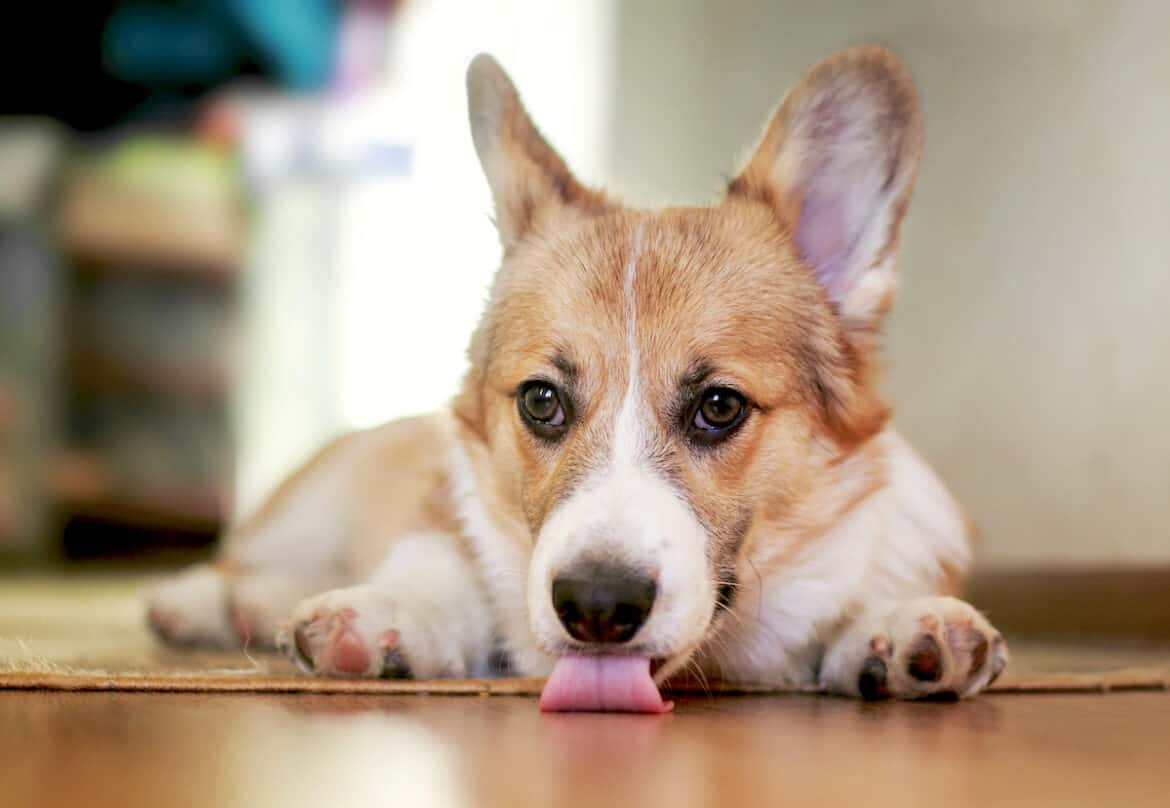Dogs are big on licking. They lick everything, from your face to their toys, and sometimes they even lick the floor. The truth is there can be several reasons behind this strange form of canine behavior.
Why does your dog lick the floor after eating? Your dog could be licking the floor after eating simply to scoop up any food residue left there. Or, if your floor is clean and your dog is licking it all the time, excessive licking can be linked to gastrointestinal, behavioral, or neurological problems.
Either way, you always have the option of booking a quick visit to your vet to put your mind at ease – especially if you’ve noticed other signs such as panting, coughing, etc.
You also have the opportunity to go through this doggo-comprehensive guide I’ve put together to put all your worries to rest.
Why Your Dog Licks the Floor After Eating
As I said earlier, the reasons behind your dog licking the floor can mainly be divided into three categories: behavioral, gastrointestinal, and sometimes neurological. I’ll tackle each category in depth to make sure you don’t miss out on any crucial details. Here goes…
Behavioral Concerns
Your dog may take to licking the floor after chowing down on its food because it’s completely bored out of its mind. And, if your canine is still in the throes of puppyhood, then leaving your pupper mentally or physically unstimulated is asking for trouble.
Additionally, dogs are social animals, and they love spending time with their family. Leaving your pooch all on its lonesome for too long can cause problems like separation anxiety.
Symptoms of stress include:
- Excessive panting
- Excessive drooling
- Excessive barking and whining
- Destructive behaviors such as chewing on furniture or digging through trash
- Depression
- Restlessness
Thankfully, boredom and anxiety can be taken care of by a little extra love and effort from you. If your doggo is bored, try not to miss out on its daily dose of exercise. That’ll not only help distract your pet, but it will also help build up its reaction to such stimuli.
Another brilliant way to stave off doggy boredom is to invest in some puzzle or interactive toys that’ll keep your dog occupied in a healthy way.
On the other hand, if your pet is showing signs of suffering from anxiety, you’re going to have to figure out the source of its discomfort. Dog anxiety can be fear, separation, or age-related.
If you’re still unsure about how to figure out what’s causing your furbaby stress, your local vet may be able to help you out in finding and treating the cause of your pet’s anxiety.
Gastrointestinal Concerns
Canines with ELS have more than a 50% chance of suffering from a gastrointestinal disease. If you’re wondering what ELS stands for, don’t freak out – it’s just short for Excessive Licking of Surfaces. Sounds a little goofy, we know, but it’s important to pay attention when your dog’s behavior changes.
Dog experts suggest that if your dog is easily distracted from its floor licking activity, then there’s a behavioral component to the problem. However, if you can’t divert your canine from its licking activity easily, or if your pet immediately returns to it, the chances of a medical condition are higher.
Most canines with ELS generally have GI tract problems like ulcers, pancreatitis, liver disease, etc. Other causes also include infected teeth, adrenal disease, and intestinal parasites.
If you’re unable to distract your pet from its licking routine, no matter what, it’s best to get your canine checked by the veterinarian as soon as possible.
Neurological Concerns
Compulsive behavior in dogs, like excessive licking, maybe a sign of obsessive-compulsive disorder (OCD). However, apart from licking the floor continuously, canines with OCD may also display a marked variance in energy levels and weight-loss.
There’s a mistaken belief that OCD in dogs is more of a behavioral concern amongst some in the canine world. While there are behavioral components to the condition, it’s more to do with genetics and neurophysical elements.
Diagnosing and treating OCD in canines is your vet’s domain. And, thankfully, veterinarians generally employ a multi-pronged strategy to help your furbaby get better. For example, apart from psychotropic drugs, dogs with OCD also receive behavioral and desensitization training to help them cope.
Related Questions
As always, I’ve gathered some relevant FAQs for your reading pleasure. If you’ve still got a few unanswered queries, don’t forget to check this section out.
Is Excessive Licking A Sign Of Pain In Dogs?
Excessive licking in dogs may be linked to pain and health conditions like ulcers, tooth infections, throat problems, etc. If you’re not able to divert your pet’s attention from licking for very long (or at all), it’s best to take it to the veterinarian for a check-up.
How Do I Stop My Dog From Licking The Floor?
Whether or not you can help your dog get over its floor licking habit depends on the reason behind its behavior. If a behavioral problem is causing your canine to act out, you can try puzzles or toys to relieve its boredom or figure out the cause of its anxiety.
However, if your pooch’s licking is related to a medical or neurological problem, then your best bet for helping your dog is your vet.
Up Next: My Dog Keeps Waking Me Up At Night To Poop
